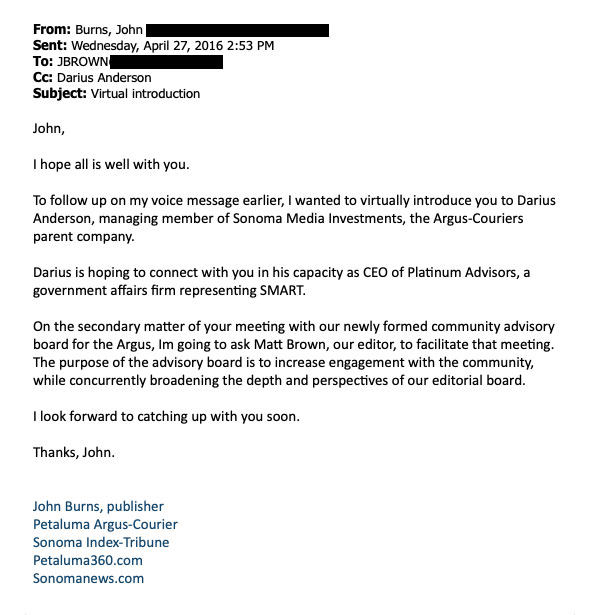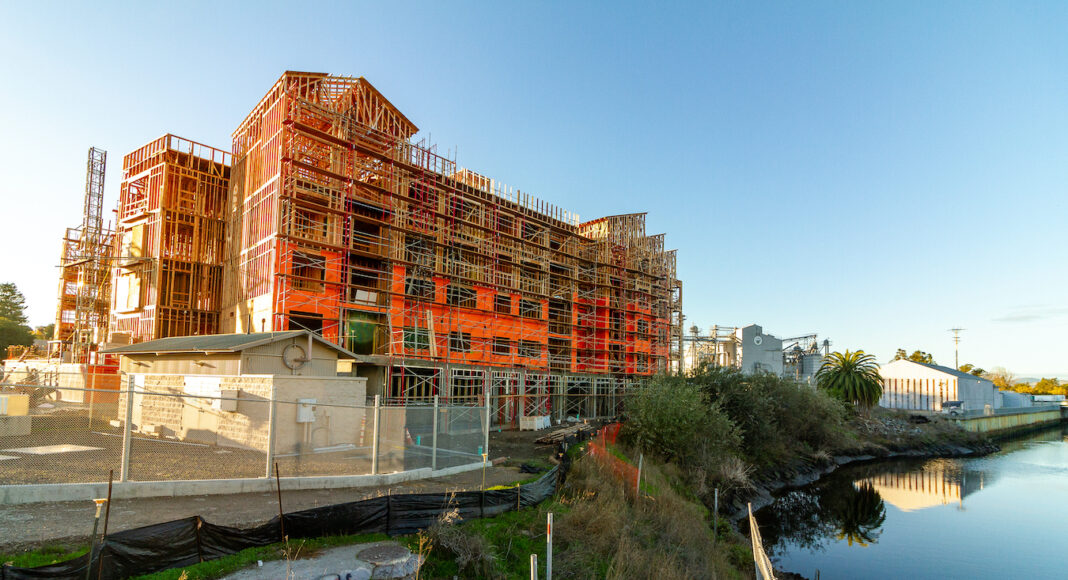This article is the second part of a series. Read the first story here.
Last week, we reported that two owners of the Press Democrat, Darius Anderson and Doug Bosco, helped craft a state-funded bailout deal benefiting Bosco’s privately owned Northwestern Pacific Railroad Company while Anderson’s Platinum Advisors was a contract lobbyist for SMART from 2015 to 2020.
This week, we report the details of a real estate transaction in downtown Petaluma in which the A. G. Spanos Corporation paid $1.4 million to SMART and $1 million to another public rail agency which is financially intertwined with Bosco’s railroad company for their “right of ways” on less than 600 feet of railroad track traversing the triangular lot upon which Spanos is currently building the North River Apartments. A right of way is a perpetual, transferable easement allowing its owner to traverse the property of another. Without securing these easements, Spanos’ project was dead in the water and could not move through Petaluma’s planning process.
The Spanos property abuts the Petaluma tidal estuary, a row of historic businesses and restaurants on Petaluma Blvd. North, and Hunt & Behrens livestock, poultry and pet-feed operation. Public records show that SMART’s executive director, Farhad Mansourian, allowed Anderson to guide SMART’s easement sale to Spanos. Simultaneously, Bosco negotiated Spanos’ purchase of an overlapping right of way on the short spur owned by the North Coast Railroad Authority. “NCRA” is a state-chartered rail agency which critics say was largely operated to benefit Bosco’s company, commonly known as NWP Co.
Mansourian allowed Anderson to work on several projects that were outside the contracted scope of work of Platinum Advisors’ role as SMART’s Sacramento lobbyist, which began in 2015. Last week, we reported on how Anderson’s firm, as part of its work for SMART, lobbied on state legislation which helped the interests of his business partner, Bosco, as the NCRA and the NWP Co foundered. This week we report another instance of Anderson leveraging his position as SMART lobbyist to benefit his media business partner and political mentor, Bosco.

Selling the Right of Ways
Our story begins before Anderson began lobbying for SMART, when, in November 2012, Poppy Bank, then known as First Community Bank, settled an outstanding $3.45 million debt by foreclosing on the owner of a property at 368-402 Petaluma Blvd. North, according to county real estate records.
In a phone call on March 29, 2016, Michael Spanos, Anderson and Mansourian initiated 18 months of negotiations between the rail agencies and Spanos’ family real estate development company, the A.G. Spanos Corporation. Once they received the easement rights, and were positioned to line up building permits from local agencies, Spanos planned to purchase the property from Poppy Bank.
In September 2017, Spanos bought the lot from Poppy Bank for just over $2 million, while Bosco served on the bank’s board of directors. But it is the events that transpired in between that first phone call and the sale of the lot to Spanos that raise eyebrows.
On Monday, April 25, 2016, less than a month into the negotiations, Mansourian emailed Anderson and Bosco: “It is my sense that Darius [Anderson] and Spanos will now approach Petaluma for discussions.”
Anderson reached out to Petaluma’s then–City Manager John Brown.
On Wednesday, April 27, John Burns, the longtime publisher of the Petaluma Argus-Courier, and Anderson’s employee, introduced Anderson to Brown in an email.
“Darius is hoping to connect with you in his capacity as CEO of Platinum Advisors, a government affairs firm representing SMART,” Burns wrote to the city manager.
Documents show that Bosco was, at the same time, formalizing his role in the real estate negotiations.
On July 28, 2016, Bosco signed an agreement with NCRA Director Mitch Stogner, allowing Bosco’s privately owned NWP Co to negotiate the sale of the Petaluma easements on behalf of the public agency. In return for NWP Co’s work, NCRA agreed that “All proceeds from the sale of the Petaluma Easements shall first be used to reimburse NWP Co.” for a portion of the millions of dollars the public agency then owed Bosco’s NWP Co, as we reported last week.
Bosco wore multiple hats during the negotiations. In some email exchanges, he appears to speak on behalf of the NCRA. In other emails, he shares information about the internal discussions going on at Poppy Bank, which owned the property Spanos hoped to buy after the rail agencies relinquished their easements.
The two parties Bosco seemed to be representing had fundamentally different interests in the negotiations. If the NCRA negotiated a higher price for its easements, Spanos would presumably have less money available in its project budget to purchase—and later develop—Poppy Bank’s property. According to emails obtained by the Bohemian/Pacific Sun, this dynamic led to tensions and delays in the negotiations.
In early 2017, the Spanos Corporation complained to Anderson about Bosco’s role in the project.
In a Jan. 4, 2017 letter, sent about eight months after Spanos began negotiating with the two rail agencies, Bosco’s NWP Co informed Petaluma’s Planning Manager, Kevin Colin, that, although Spanos had approached the railroad company, “no agreement [to sell the rights] has been consummated.” Apparently Bosco was not satisfied with the amount of Spanos’s initial offer to purchase the easements.
On Jan. 10, Alexandro Economou, an executive at the Spanos Corporation, warned Anderson that the letter from Bosco’s NWP Co threatened to delay the whole project.
“Petaluma will not move us forward to [the] planning commission because they are concerned with the issues at hand here. In light of Doug [Bosco]’s recent letter to them it is easy to understand why they might feel that way,” Economou wrote.
On March 6, after further failed negotiations, Economou emailed Poppy Bank employee, Kevin Downey, who appears to have been managing the property sale, with a similar complaint.
“I am aware of some discussions happening between Doug Bosco and others at the bank regarding our property… Because of the letter Doug Bosco sent to the city six weeks ago, the city has refused to process our application any further and our entitlements have been delayed… It is a direct result of the Bosco letter which has cost us time and lost momentum with the city,” Economou wrote.
Two days later, on March 8, Anderson forwarded Economou’s complaining email to Bosco. Bosco responded by sharing Poppy Bank’s view of the situation.
“The bank will not go along with any encumbrance on their property. It would be too risky for them to put a lien for $750k on their property while the SMART right of way is still in existence. The bank could end up with SMARTs rail easement and a $750k lien if things fell through,” Bosco wrote.
Anderson then shared the whole conversation with Mansourian.

Ultimately, the parties reached an agreement. In April 2017, Spanos signed agreements to pay SMART $1.4 million and the NCRA $1 million to release their claims to the property. In other words, Spanos paid approximately $4,285 per linear foot for a run of old railroad track that was disintegrated and unuseable, as recorded by a pre-development Google Earth satellite photo.
According to county records, Spanos purchased the property from Poppy Bank for $2.15 million in September 2017.
Notably, the price paid for the real estate itself was hundreds of thousands of dollars less than the price exacted by Anderson and Bosco for the right to tear up the track.
In an August 2017 memo, NCRA director Mitch Stogner suggested that the public agency’s board of directors, which is composed of representatives of the counties and cities along the freight line, use $264,712 of the $1 million easement sale proceeds to pay down a $4.1 million debt owed to Bosco’s company.
According to Stogner’s memo, the NCRA had already paid $50,000 from the easement proceeds to NWP Co, which did not own the right of way. All told, Bosco’s NWP Co received $304,712 from the sale of the publicly-owned property, according to the NCRA documents. And, as we learned in last week’s report, a few years later, NWP Co would pocket $7.47 million in state funding as part of the NCRA shut-down process.

Amnesia
Despite Bosco and Anderson’s overlapping business interests, no one at SMART, the NCRA or Poppy Bank appears to have complained about the conflict of interest during the negotiations which resulted in windfalls for SMART, NCRA and NWP Co. Astoundingly, SMART now claims to have forgotten why Anderson was involved in the negotiations.
After receiving questions from the Bohemian/Pacific Sun about Anderson’s role in the easement discussions, SMART spokesman Matt Stevens requested to review the emails related to the negotiations. In response, we provided Stevens, Mansourian, Anderson and two SMART board members—chair David Rabbitt and vice-chair Barbara Pahre—with copies of the emails, most of which were released by SMART in response to our public records requests.
In a written response on Nov. 2, Stevens said that SMART officials “do not recall what involvement, if any, Mr. Anderson had on negotiations or the project.”
In written responses to similar questions, Bosco acknowledged that he represented the NCRA and NWP Co in the negotiations, but denied that Poppy Bank had anything to do with the easement sale.
Bosco wrote, “Neither NWP Co nor I personally received any compensation from this transaction. I have no idea what, if any, relationship Spanos had with Poppy Bank or what benefit, if any, accrued to the bank… the bank was not a party to this or any other railroad related transaction.”
The records obtained by the Bohemian/Pacific Sun show otherwise.
Anderson, Poppy Bank and the Spanos Corporation did not respond to requests for comment. Through its legal counsel, Elizabeth Coleman, who also serves as the Deputy Counsel of Sonoma County Office, NCRA provided documents cited in this story, but declined to respond to specific questions.
John Pelissero, Ph.D, a senior scholar at the Markkula Center for Applied Ethics at Santa Clara University, told the Bohemian/Pacific Sun that the numerous overlapping interests on display during Anderson’s time working for SMART raise serious ethical questions—even if it’s just an appearance of a conflict of interest.
“When it comes to ethical issues, it doesn’t matter whether it’s an intended or a perceived conflict of interest. They both present ethical problems for those who are involved. And when you’re dealing with government, when you’re dealing with the public citizens and taxpayers, that’s where one really needs to pay special attention to the perception that you’re acting in your role as a government agency or somebody who works for a government agency in a way that creates a conflict of interest,” Pelissero said.
For their part, Sonoma Media Investments’ publications didn’t scrutinize the Spanos easement deal too closely.
On Nov. 24, 2017, the Petaluma Argus-Courier published a reported article about Spanos’s “long-stalled” North River Apartments project, which, according to the paper, had run into “complications with rail agencies’ easements that took two years and $2.4 million to resolve.”
The article did not mention that Anderson and Bosco, two of the Petaluma Argus-Courier’s owners, were deeply involved in the prolonged negotiations, the delay of which appears to have benefited Bosco.
Instead, on Feb. 1, 2018, Anderson’s and Bosco’s Petaluma paper ran an editorial blaming the city officials for the delays in the Spanos project.
“Why is it that whenever a developer proposes a visionary project to remake a blighted area of Petaluma and add badly needed housing, officials demand the developer do more than is reasonable?” the editorial reads. “If developers find Petaluma’s planning process too onerous, costly or time consuming, they will simply walk away, leaving the city’s vision unrealized. There are, after all, ample opportunities elsewhere.”
The editorial once again failed to mention Anderson and Bosco’s deep involvement in the project—or that, judging from the Spanos executive’s letters to Anderson and Poppy Bank, Bosco’s letters to Petaluma delayed the project.
Other articles about SMART in the Argus-Courier and Sonoma Media Investments papers routinely failed to mention that Anderson’s Platinum Advisors had a lobbying contract with SMART. In the case of the Argus-Courier, the newspaper’s longtime publisher, John Burns, clearly knew about Platinum Advisors’ relationship to SMART. After all, he introduced Anderson to Petaluma’s city manager John Brown as a SMART lobbyist in his April 2016 email to Brown.
Burns did not respond to a request for comment.

Rubbing Shoulders
Anderson’s extra work for SMART wasn’t restricted to helping to negotiate the NCRA multi-million dollar wind-down that benefitted the NWP Co as we reported last week, nor to guiding the Petaluma easement deal that benefited the financially conjoined NCRA and NWP Co.
Emails show that, between 2015 and 2018, Mansourian often turned to Anderson for help with SMART’s federal lobbying efforts despite the fact that SMART pays Van Scoyoc Associates $10,000 per month to lobby federal officials. And, while Platinum Advisors does sport a Washington, D.C., office, records show that the firm never formally registered to represent SMART in the nation’s capital.
In May 2015, Anderson invited Mansourian to a fundraiser for Rep. Kevin McCarthy, a Republican congressman from Bakersfield who served as Republican Majority Leader between June 2014 and January 2021. The fundraiser, held on Friday, June 19, 2015, at Anderson’s Wing and Barrel Ranch in Southern Sonoma County, cost $43,800 to “sponsor” and $2,700 for an individual ticket, according to an invitation obtained by the Bohemian/Pacific Sun. Mansourian was invited to the “Special Sonoma Trap Shoot and Wine Reception” as Anderson’s special guest.
Weeks later, emails show that Anderson directly connected Mansourian with McCarthy. In July 2015 Mansourian told Anderson that he had met with McCarthy, although it is unclear based on the emails, what they discussed.
In September 2015 Mansourian asked Anderson to intervene with McCarthy again after SMART’s Washington lobbyist reported that McCarthy would ask the Chairman of the House Transportation, Housing and Urban Development Appropriations Subcommittees for a $20 million appropriation for SMART.
“You asked me to give you a heads up so you can call Mr. McCarthy on his private cell BEFORE our lobbyist in DC follows up with his staff,” Mansourian wrote to Anderson on Sept. 16, 2015.
In January 2016, Mansourian sent Anderson a Politico article profiling McCarthy’s incredible fundraising ability: raking in $11 million in 2015, more than any of his Republican colleagues.
“We did our part!!!” Anderson responded.
Anderson then invited Mansourian to two more fundraisers—one on Oct. 21, 2016 and another on Sept. 17, 2018—for Congressman Jeff Denham, a Republican who went on to chair the House Railroads, Pipelines and Hazardous Materials Subcommittee. During the same time period Mansourian also asked Anderson to contact Denham in coordination with SMART’s federal lobbying firm.
Anderson’s federal lobbying and fundraising efforts weren’t restricted to well-placed Republicans. Emails show that Anderson’s firm also invited Mansourian to a San Francisco fundraiser for Kamala Harris, then running for a Senate seat, and that Anderson’s firm attempted to arrange a meeting between Mansourian and an employee of then-Vice President Joe Biden.
When SMART moved to renew Platinum Advisors’ state lobbying contract in late 2018, the scope of work was updated in just one way. In addition to guiding the transportation agency’s state efforts, Platinum Advisors was now expected to “support SMART as requested in any federal legislative efforts.”
However, despite its work under the first contract and the tacit acknowledgement of the federal work included in the second contract, Platinum Advisors still did not formally register to represent SMART in federal matters.
SMART-spokesman Matt Stevens said that SMART used Anderson’s firm to lobby on federal issues because “Platinum Advisors was familiar with those issues.”

Closing the Contract
SMART’s contract with Platinum Advisors ended unceremoniously in early 2020 while SMART’s supporters waged a high-cost fight over the agency’s future.
In the months ahead of a March 2020 election, Molly Gallaher Flater, a member of Poppy Bank’s board of directors and CEO of real estate developer Gallaher Homes, dumped nearly $2 million into a campaign opposing Measure I, a ballot initiative which would have extended the quarter-cent sales tax supporting SMART from 2029 to 2059.
Although Bosco served on Poppy Bank’s board of directors for more than 10 years and co-founded California Clean Power—an energy-consulting company—with Gallaher Flater’s father, Bill Gallaher, in 2014, Bosco was on the other side of the table from the Gallahers when the Measure I campaign flyers were stuffed into voter mail boxes.
In December 2016, Bill Gallaher sued Bosco and Anderson’s Sonoma Media Investments for libel over a series of Press Democrat articles scrutinizing the legality of Gallaher’s political contributions to local candidates in the November 2016 elections. A court dismissed the case in March 2019, requiring the Gallahers to pay SMI’s legal bills.
Bosco told the Bohemian/Pacific Sun that he left Poppy Bank’s board in April 2019 for personal reasons.
In a mid-February 2020 mailer, the Gallaher-backed anti-Measure I “Not so SMART” campaign called out Darius Anderson personally, questioning whether the media mogul’s work as a SMART lobbyist had swayed the judgement of the Press Democrat’s editorial board, which endorsed Measure I in early February.
On Feb. 20, the Press Democrat’s editorial board responded to the “No” campaign’s “scurrilous flier.”
“For the record, Darius Anderson isn’t a member of our editorial board, and neither are any of the investors named in the anti-SMART flier. None of them has ever tried to influence our positions. They see our editorials at the same time you do—when they appear in The Press Democrat,” the editorial stated.
Still, the reputational damage was obvious. Anderson signed paperwork terminating Platinum Advisor’s lobbying contract with SMART on Feb. 20, the very same day the Press Democrat’s editorial ran.
In a March 3 election, Measure I failed to reach the required two-thirds voter approval in either Sonoma or Marin County. Weeks later, SMART’s ridership numbers were crushed by the first Covid-19 shelter order. The agency, like public transit agencies across the country, has struggled to balance its books ever since.
SMART has an additional handicap. More than a year after parting ways with Anderson’s lobbying firm, SMART’s board of directors has yet to hire a new lobbying firm to represent the ailing transit agency’s interests in Sacramento. Stevens, the SMART spokesman, says that the agency is handling its state-advocacy affairs in-house for the time being, which begs the question of why it ever needed Anderson’s firm.
Last month, SMART announced that the agency’s long-time director Farhad Mansourian is retiring. His replacement, the former chief operating officer of the Utah Transit Authority, is scheduled to take over on Nov. 29.
For better or worse, SMART appears to be entering a new era. The roles of Anderson and Bosco in shaping the agency’s future remains to be seen.











